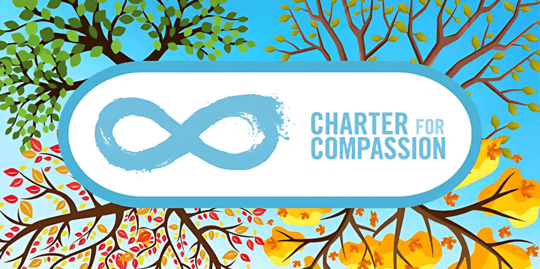Home Inside the Globe with Gail Straub

Earlier this month, I had the opportunity to attend the Global Read webinar featuring Gail Straub’s latest book, Home Inside the Globe: Embracing Our Human Family. The event was hosted by the Charter for Compassion and facilitated by Dr. Janice Adams, an Emmy Award–winning journalist, historian, and author. What began as a literary conversation unfolded into something much larger: an exploration of compassion, belonging, and what it means to recognize ourselves as part of a global human family.
From the beginning, Straub set the tone with her definition of compassion, not simply as kindness, but as an “open heart and a clear mind.” For her, compassion is the ability to welcome what is unfamiliar, surprising, or even uncomfortable, and to let it expand our humanity. She reminded us that unity in diversity is not only an ideal, but a necessity for our shared future. This made me reflect on a personal question that stayed with me throughout the event: How can I expand my heart to include worldviews that challenge my own?
Through excerpts from her book, Straub guided us on her journeys across cultures: walking with Tuareg nomads in the Sahara, sitting at sacred sites in Ireland, and reflecting on her life’s calling in the Medina of Marrakesh. Each encounter, she explained, brought her face-to-face with worldviews outside her own and challenged her to reconsider assumptions she had carried as a young American woman.
The Tuareg, for instance, taught her that art, poetry, and music could be anchors in the face of suffering and that humans are not separate from their environment but indivisible from it. In Ireland, Celtic traditions helped her reconcile the tensions between her Catholic upbringing and her feminist identity, showing her that spirituality can hold many truths at once. These stories showed how deeply transformative it can be to not only witness but embrace unfamiliar perspectives, turning difference into a source of wisdom.
One of the most moving moments came when Straub recalled her visits to Syrian refugee camps in Jordan. After sharing their stories of loss and violence, the women she met urged her not to tell the world about their suffering but to tell the story of their resilience, dignity, and unbroken sense of humanity.
Straub described how, despite their displacement, these women sustained community through small acts of care: teaching children songs from their villages, baking bread together in makeshift kitchens, and keeping alive traditions that anchored them in hope. Their emphasis on not wanting to be remembered only as victims but as carriers of dignity and strength was a profound lesson. It reminded me that compassion is not about pity but about honoring the fullness of another’s humanity.
This powerful testimony raised another question for me: How can we, together, tell stories of resilience and dignity that strengthen our shared humanity? It is a question that resonates deeply with my own work and with the mission of the High Atlas Foundation (HAF). Lasting development is rooted in dignity, compassion, and the strength of communities themselves. Just as Straub emphasized that no culture holds all the answers, HAF’s approach recognizes that the wisdom needed for sustainable change often comes directly from local communities, whose voices and traditions guide the way forward.
As I reflected after the webinar, I realized that the questions sparked by Straub’s words are not meant to be answered once and for all. They are practices, guidelines for how we might live, work, and connect with others. Expanding our hearts to embrace challenging worldviews and committing to tell stories of resilience and dignity are acts of compassion that require ongoing attention.